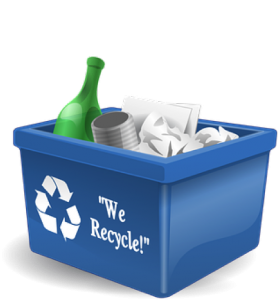Repurpose and Recycle: How Decluttering Can Help Your Community and the Environment
 Do you long to see your home orderly and clutter-free, but aren’t sure how to dispose of things you want to get rid of in an eco-friendly manner? Landfills are overflowing with appliances that leach toxins into the soil, mattresses that are mostly non-biodegradable and tons of plastic material that just keeps piling up. Recycling entered the public consciousness years ago, yet many Americans cling to the old “throw-away society” doctrine, while others simply throw things away because they don’t know what else to do with them. Fortunately, there are countless resources for disposing of clutter without harming the environment. And you’d be surprised at how many of them help other people. Here are a few ideas to get you started.
Do you long to see your home orderly and clutter-free, but aren’t sure how to dispose of things you want to get rid of in an eco-friendly manner? Landfills are overflowing with appliances that leach toxins into the soil, mattresses that are mostly non-biodegradable and tons of plastic material that just keeps piling up. Recycling entered the public consciousness years ago, yet many Americans cling to the old “throw-away society” doctrine, while others simply throw things away because they don’t know what else to do with them. Fortunately, there are countless resources for disposing of clutter without harming the environment. And you’d be surprised at how many of them help other people. Here are a few ideas to get you started.
Repurposing
Charitable and community organizations are always in need of materials that can be reused or repurposed. Donating can also be a way to benefit social initiatives that mean something to you personally. For example, if you have tools, electrical or building supplies, you can donate them to artist workspaces through Scrapusa.org, which coordinates the creative repurposing of these materials. You can also contact your local mental health center. These facilities provide patients with safe, creative and recreational activities that focus on various artistic media. Local schools and churches can turn your cast-off items into fodder for children’s creativity.
Hit the cloud — and your closets
If someone in the family is a photo junkie, chances are you have piles and piles of old photos cluttering your drawers, basement and closets. You can take the time to weed through them all and get rid of those candid shots from the great Labor Day picnic of 1989, or scan your photos and send them to the cloud, where they’ll be stored safely. You can even organize them into files based on year, event, etc.
If your closet is a decluttering focal point, why not make separate piles of the stuff you don’t want anymore based on whether it’s to be donated, kept or thrown out/recycled. Think of it as an environmentally responsible way to make space for … more clutter.
Appliances
The next time you upgrade to a bigger television, don’t automatically leave your old one at the curb and hope the trash men or someone with a flatbed truck will haul it away. Instead, reach out to an orphanage, a home for abused children, or mental institutions. If it’s still working, they can definitely use it. They may even be able to fix an appliance that no longer works quite the way it used to. The bottom line is, don’t just send it to the dump. Find a way it can benefit someone in need. Do the same with old bedding material, which comprises a significant percentage of material in landfills today.
Natural cleaning
It makes sense to clean the place as long you’re decluttering it, but you could undo all the positive steps taken during the decluttering process to preserve the environment by using commercial cleaning products heavy in toxic chemicals. Instead of using bleach-based products, use baking soda and warm water to get up all the grime, household dust and mildew. Use essential oils in a diffuser rather than a plug-in air freshener, many of which contain volatile organic compounds.
Supporting the environment doesn’t just mean recycling paper and plastic. It can also mean helping people in need, or benefiting a worthy social cause by donating useful items instead of throwing them out with the trash. Keep that in mind the next time you need to do some decluttering.
Author
Suzie Wilson is an interior designer with more than 20 years experience. What started as a hobby (and often, a favor to friends) turned into a passion for creating soothing spaces in homes of every size and style. While her goal always includes making homes look beautiful, her true focus is on fashioning them into serene, stress-free environments that inspire tranquility in all who enter. The Ultimate Guide to Prepping Your Home for an Open House is filled with tips, tricks and other advice based on Suzie’s years of experience in interior home design that will set you up for success.
Courtesy of Pixabay.com.


Sorry, the comment form is closed at this time.